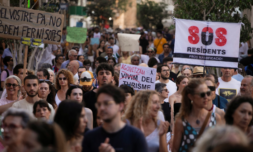Post-pandemic, several countries introduced digital nomad visas to give their economies a much-needed boost. As a result, local residents in Spain and Portugal have been priced out of the housing market, sparking anti-tourism rallies and an air of hostility towards foreigners.
It seems somewhat ironic writing this from Spain, where I’ll be residing until the end of November when the ninety-day Schengen rule says I must head back to the UK (thanks a lot, Brexit).
This is the second time I’ve moved countries in the last year, starting with three-months in Portugal from October to December 2023 and ending with this current stint of digital nomadship exploring the southern regions of its next-door neighbour.
I say ‘ending’ because I won’t be doing this again.
As unforgettable as my experiences have been during these short stays – made so by the people I’ve encountered along the way – I haven’t failed to observe the irrefutably negative impact that the kind of tourism I’m involved in is having on those born and raised in the cities I’ve chosen to visit.
By far most visible in Lisbon, people with roots in the capital simply can’t afford to live there anymore, thanks to the foreigners (my hands are up) who, funded by wages notably higher than the minimum, are flocking there and driving up prices.
This is especially the case with rental costs which, between 2015 and 2021, shot up by 115% and initiated a crisis that many have been protesting against since.
‘Tell the government that it is necessary to take measures to lower the price of housing and to put the lives of those who live and work in our country first,’ says Andre Escoval from the Porta a Porta movement, which has been marching with banners that read: ‘our neighbourhoods are not your business,’ and ‘I have to choose between having a roof over my head or being able to eat.’
Despite the fact that I’m literally the enemy here, I wholeheartedly agree with Escoval that Portuguese natives should be top priority and that the massive physical transformations of these digital nomad hotspots should not come at the expense of the citizens at the heart of them.
The main reason I came to Spain instead of returning to Portugal is because, first-hand, I witnessed the toll that gentrification is increasingly taking there and could feel the local’s mounting hostility towards remote workers – which is by no means a criticism; genuinely who can blame them.
It’s also why I’ve decided to jump from place to place every few weeks, to play my part in boosting the economy without contributing too much to this issue, though I know I still most likely am.




















